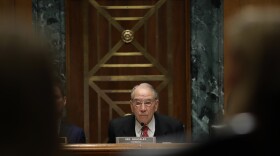
Alison Kodjak
Alison Fitzgerald Kodjak is a health policy correspondent on NPR's Science Desk.
Her work focuses on the business and politics of health care and how those forces flow through to the general public. Her stories about drug prices, limits on insurance, and changes in Medicare and Medicaid appear on NPR's shows and in the Shots blog.
She joined NPR in September 2015 after a nearly two-decade career in print journalism, where she won several awards—including three George Polk Awards—as an economics, finance, and investigative reporter.
She spent two years at the Center for Public Integrity, leading projects in financial, telecom, and political reporting. Her first project at the Center, "After the Meltdown," was honored with the 2014 Polk Award for business reporting and the Society of Professional Journalists Sigma Delta Chi award.
Her work as both reporter and editor on the foreclosure crisis in Florida, on Warren Buffet's predatory mobile home businesses, and on the telecom industry were honored by several journalism organizations. She was part of the International Consortium of Investigative Journalists team that won the 2015 Polk Award for revealing offshore banking practices.
Prior to joining the Center, Fitzgerald Kodjak spent more than a decade at Bloomberg News, where she wrote about the convergence of politics, government, and economics. She interviewed chairs of the Federal Reserve and traveled the world with two U.S. Treasury secretaries.
And as part of Bloomberg's investigative team, she wrote about the bankruptcy of General Motors Corp. and the 2010 Gulf Oil Spill. She was part of a team at Bloomberg that successfully sued the Federal Reserve to release records of the 2008 bank bailouts, an effort that was honored with the 2009 George Polk Award. Her work on the international food price crisis in 2008 won her the Overseas Press Club's Malcolm Forbes Award.
Fitzgerald Kodjak and co-author Stanley Reed are authors of In Too Deep: BP and the Drilling Race that Took It Down, published in 2011 by John Wiley & Sons.
In January 2019, Fitzgerald Kodjak began her one-year term as the President of the National Press Club in Washington, DC.
She's a graduate of Georgetown University and Northwestern University's Medill School of Journalism.
She raises children and chickens in suburban Maryland.
-
An interdisciplinary team in San Francisco uses acupressure, massage, counseling and other methods, as well as medicine, to help kids get relief from chronic pain. But such pediatric centers are rare.
-
A former official in the civil rights office says the unit seems afraid to offend U.S. Customs and Border Protection and ICE. Meanwhile, the complaints of abuses of families continue to pile up.
-
Certain high-cost drugs are straining state budgets. A new deal approved Wednesday allows Louisiana to spend a fixed amount for unlimited access to a costly cure. Other states may try to follow suit.
-
A quirk in the law gives an older opioid addiction treatment "orphan drug" status — and a period of exclusive market access. That may prevent some new therapies from reaching patients for years.
-
A federal agency issued a proposed rule Friday that rolls back Obama-era protections for transgender patients. Advocates for transgender people say the rule leaves them vulnerable to discrimination.
-
The rule strengthens protections for health care providers who are unwilling to provide services like abortions. Critics say it could put women's health in danger.
-
The Senate Finance Committee will hear Tuesday from executives from the biggest pharmacy benefit managers. Confidential rebates paid to the PBMs are expected to draw scrutiny.
-
As congressional lawmakers continue to turn up the heat on drugmakers, insurers and middlemen over the price of many medicines, one player says it will limit patients' share of the cost of insulin.
-
Lawmakers in the House and Senate are pressing companies to lower prices for insulin which is essential for many people with diabetes. The price is 10 times higher today than it was 20 years ago.
-
The Trump administration wants to increase transparency in prescription drug pricing. But health economists say the administration's call to tie prices to what other nations pay might work better.










